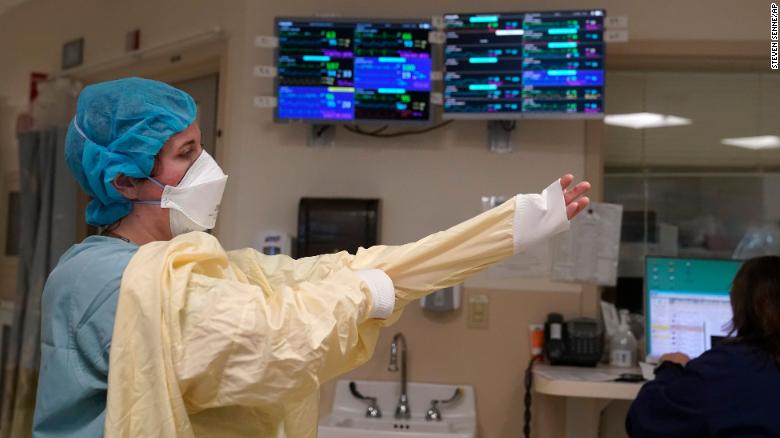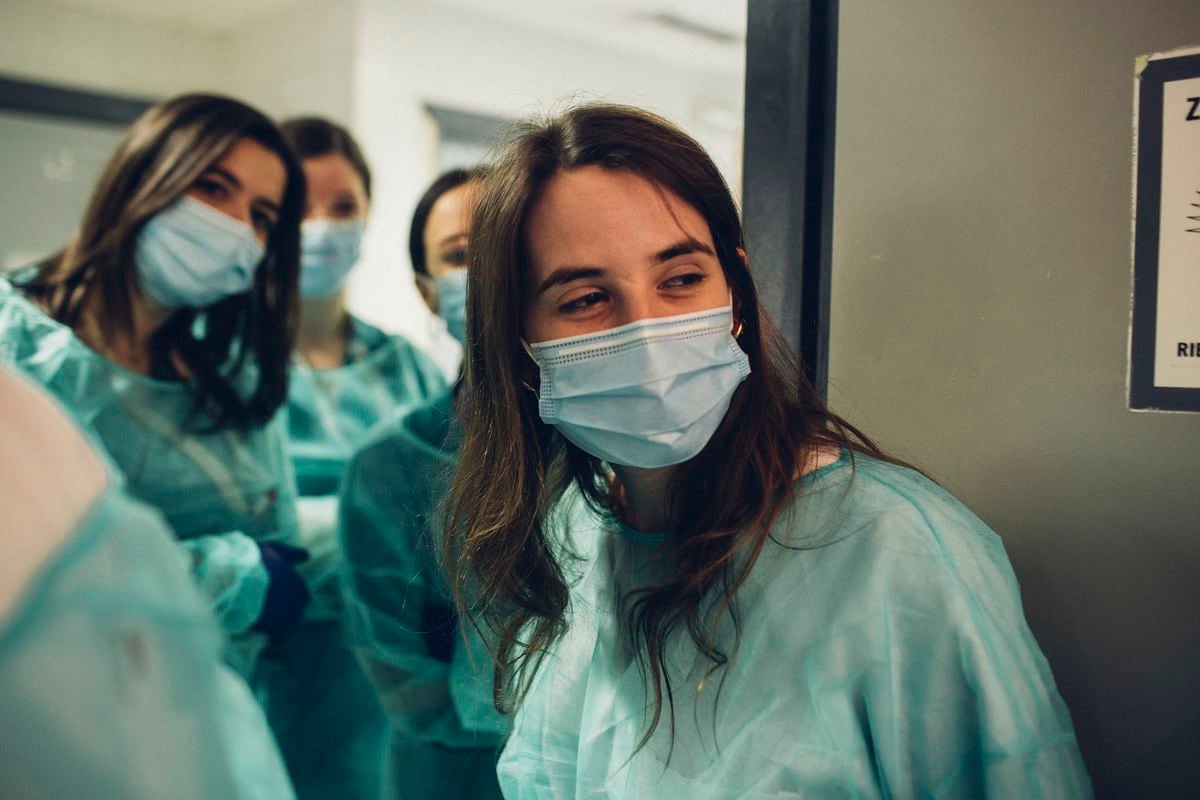This is the projection of deaths from covid-19 in the US 0:32
(CNN) -
With a record number of Americans infected with COVID-19, largely due to the rapidly spreading omicron variant, health care systems in some US states are riddled with medical units. intensive care almost full.
Four states have less than 10% remaining capacity in their ICUs, according to data Wednesday from the US Department of Health and Human Services (HHS): Kentucky, Alabama, Indiana and New Hampshire.
Quebec announces that it will fine the unvaccinated and, a day later, appointments to receive the first dose are triggered
And as the infection spreads, states and healthcare systems across the country face a shortage of available healthcare workers, who face a higher likelihood of COVID-19 exposure and must isolate themselves after testing positive.
Members of the National Guard and other federal emergency teams have been deployed to hospitals and long-term care facilities in places like New Hampshire to ease the burden of medical and non-medical tasks.
America: the countries with the most cases per million inhabitants 1:03
"This is part of the winter surge, part of the long-term, so we implemented many of the mitigation strategies and measures early on to help provide some flexibility to hospitals and healthcare systems," said the Governor of New Hampshire, Chris Sununu, on Wednesday.
advertising
Five other states are very close to only having 10% of ICU capacity available, according to HHS data: New Mexico, Missouri, Rhode Island, Mississippi and Georgia.
Nationwide, hospitalizations for covid-19 have reached record levels.
As of Wednesday, at least 151,261 Americans were in need of medical attention for the virus.
Early research indicates that the omicron variant is less likely to cause hospitalization than previous covid-19 variants.
But omicron's higher transmissibility means that more people at higher risk of serious disease, such as those who are not vaccinated or immunosuppressed, will become infected.
"Ómicron continues to burn in the community, growing at levels we've never seen before. Ómicron is significantly more contagious than even the delta variant," Kentucky Governor Andy Beshear said Monday.
"If it spreads at the rate we're seeing, it will certainly fill our hospitals."
While conditions are not as severe as they were at the start of the pandemic nearly two years ago due to the availability of vaccines and other treatment options, staffing shortages in hospitals are a real concern during this latest surge, said Dr. Craig Spencer, director of global health in emergency medicine at New York-Presbyterian / Columbia University Medical Center.
"The problem is that at the moment we have hospitals where there are not enough nursing staff to care for the patients who are admitted, the patients with covid and the patients who do not have covid," Spencer told CNN's Laura Coates on Wednesday.
"That is exactly why we must do everything possible to try to limit the number of infected people, not just those who are older or not vaccinated or do not have a booster, but all of them. Because each infection represents the potential to infect more people. We need to do what we can to stop that spread right now and ease the pressure on our hospitals, "Spencer said.
For those who enter emergency rooms for reasons other than COVID but test positive, hospitals have yet to invoke quarantine protocols for those patients, putting pressure on operations, he said.
And that can have an effect on all patients.
"Right now, we are still seeing sick people in need of oxygen, the vast majority of whom are not vaccinated. But many of the patients that we are seeing right now have underlying chronic conditions that are being exacerbated," Spencer said.
Those patients, he said, may include "someone who gets COVID and is dehydrated and needs to stay in the hospital, or someone who gets COVID and is too weak and can't go home because they risk getting worse. In a sense, this doesn't. it's just as bad as the kind of classic covid patients we were seeing before. But every patient who needs to stay in the hospital takes up a bed. And beds and staff are in short supply right now. "
Daily COVID-19 infections rise 47% in the US 1:13
CDC to update mask guide
Health experts reiterate the need for quality masks as never-before-seen numbers of positive COVID-19 cases hit the country.
The U.S. averaged more than 771,580 new COVID-19 cases per day over the past week, according to data from Johns Hopkins University (JHU), more than three times the average high from last winter.
It may be time to renew your mask
The U.S. Centers for Disease Control and Prevention (CDC) plans to update information on mask use, including the different levels of protection that various masks, such as cloth, surgical, or N95, provide against the spread of covid-19, said Dr. Rochelle Walensky, director of the CDC, during a virtual briefing at the White House on Wednesday.
In general, it is important that people wear whatever mask they have access to, "but omicron has changed things a bit because it is so communicable that we know that masks are even more important," said Lori Tremmel Freeman, executive director of the National Association of County and City Health Officials, to CNN on Wednesday.
"And if you have the opportunity, if you have the opportunity, if you have access to a better mask, then the recommendation would be to wear it," he said.
And he added that the N95 and KN95 masks must fit correctly to provide the best possible protection.
Vaccines are effective with teens, study shows
The death rate in the U.S. has remained lower than during last year's winter surge, often attributed to about two-thirds of vaccine-eligible Americans being fully inoculated, according to the CDC.
The country has averaged 1,817 COVID-19 deaths per day over the past week, JHU data shows.
The maximum daily average was 3,402 a year ago, on January 13, 2021.
However, the CDC's latest joint forecast predicts a potential 62,000 new deaths from covid-19 over the next four weeks, meaning that preventive vaccinations are still needed.
Does getting infected with omicron result in immunity to the virus?
0:58
The age group of the least vaccinated Americans remains under 18, and a new study of data from real-world hospitals between July and the end of October points to the effectiveness of vaccines even for those who, being more young people are generally at less risk.
The findings, published Wednesday in the New England Journal of Medicine, show that the Pfizer / BioNTech coronavirus vaccine appears to be 94% effective against COVID-19 hospitalization among adolescents ages 12 to 18 in the United States. .
"Vaccination prevented nearly all life-threatening COVID-19 diseases in this age group," wrote researchers from the CDC and a collection of hospitals and universities, who found that many more adolescents hospitalized with COVID-19 were not. vaccinated compared to those who were hospitalized for other reasons.
Among adolescents hospitalized with COVID-19, 4% were fully vaccinated, less than 1% were partially vaccinated, and 96% were not vaccinated.
By comparison, of those without COVID-19, 36% were fully vaccinated, 7% were partially vaccinated, and 57% were unvaccinated.
CNN's Jacqueline Howard, Deidre McPhillips, Naomi Thomas, Virginia Langmaid, Jason Hanna, Christina Maxouris, Claudia Domínguez, and Andy Rose contributed to this report.
Covid-19















